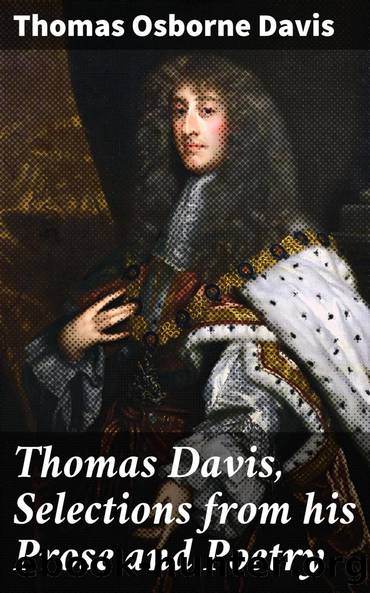Thomas Davis, Selections from his Prose and Poetry by Thomas Osborne Davis

Author:Thomas Osborne Davis [Davis, Thomas Osborne]
Language: eng
Format: epub
ISBN: 9781725141209
Google: ZJXQugEACAAJ
Publisher: CreateSpace Independent Publishing Platform
Published: 2018-08-14T00:24:07+00:00
* * *
OUR NATIONAL LANGUAGE.
Men are ever valued most for peculiar and original qualities. A man who can only talk commonplace, and act according to routine, has little weight. To speak, look, and do what your own soul from its depths orders you are credentials of greatness which all men understand and acknowledge. Such a man's dictum has more influence than the reasoning of an imitative or commonplace man. He fills his circle with confidence. He is self-possessed, firm, accurate, and daring. Such men are the pioneers of civilisation and the rulers of the human heart.
Why should not nations be judged thus? Is not a full indulgence of its natural tendencies essential to a people's greatness? Force the manners, dress, language, and constitution of Russia, or Italy, or Norway, or America, and you instantly stunt and distort the whole mind of either people.
The language, which grows up with a people, is conformed to their organs, descriptive of their climate, constitution, and manners, mingled inseparably with their history and their soil, fitted beyond any other language to express their prevalent thoughts in the most natural and efficient way.
To impose another language on such a people is to send their history adrift among the accidents of translationâ'tis to tear their identity from all placesâ'tis to substitute arbitrary signs for picturesque and suggestive namesâ'tis to cut off the entail of feeling, and separate the people from their forefathers by a deep gulfâ'tis to corrupt their very organs, and abridge their power of expression.
The language of a nation's youth is the only easy and full speech for its manhood and for its age. And when the language of its cradle goes, itself craves a tomb.
What business has a Russian for the rippling language of Italy or India? How could a Greek distort his organs and his soul to speak Dutch upon the sides of the Hymettus, or the beach of Salamis, or on the waste where once was Sparta? And is it befitting the fiery, delicate-organed Celt to abandon his beautiful tongue, docile and spirited as an Arab, "sweet as music, strong as the wave"âis it befitting in him to abandon this wild, liquid speech for the mongrel of a hundred breeds called English, which, powerful though it be, creaks and bangs about the Celt who tries to use it?
We lately met a glorious thought in the "Triads of Mochmed," printed in one of the Welsh codes by the Record Commission: "There are three things without which there is no countryâcommon language, common judicature, and co-tillage landâfor without these a country cannot support itself in peace and social union."
A people without a language of its own is only half a nation. A nation should guard its language more than its territoriesâ'tis a surer barrier, and more important frontier, than fortress or river.
And in good times it has ever been thought so. Who had dared to propose the adoption of Persian or Egyptian in Greeceâhow had Pericles thundered at the barbarian? How had Cato scourged
Download
This site does not store any files on its server. We only index and link to content provided by other sites. Please contact the content providers to delete copyright contents if any and email us, we'll remove relevant links or contents immediately.
The Secret History by Donna Tartt(19092)
The Social Justice Warrior Handbook by Lisa De Pasquale(12190)
Thirteen Reasons Why by Jay Asher(8912)
This Is How You Lose Her by Junot Diaz(6888)
Weapons of Math Destruction by Cathy O'Neil(6281)
Zero to One by Peter Thiel(5802)
Beartown by Fredrik Backman(5756)
The Myth of the Strong Leader by Archie Brown(5509)
The Fire Next Time by James Baldwin(5447)
How Democracies Die by Steven Levitsky & Daniel Ziblatt(5219)
Promise Me, Dad by Joe Biden(5154)
Stone's Rules by Roger Stone(5088)
A Higher Loyalty: Truth, Lies, and Leadership by James Comey(4964)
100 Deadly Skills by Clint Emerson(4926)
Rise and Kill First by Ronen Bergman(4790)
Secrecy World by Jake Bernstein(4753)
The David Icke Guide to the Global Conspiracy (and how to end it) by David Icke(4720)
The Farm by Tom Rob Smith(4514)
The Doomsday Machine by Daniel Ellsberg(4490)
